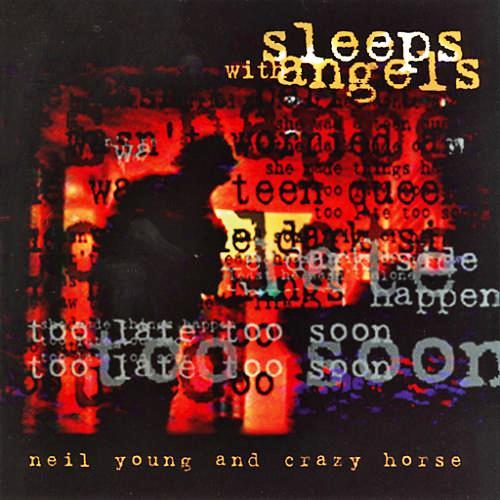Sleeps With Angels - Neil Young
$ 5.99 – $ 8.99
Though it once again reunites him with Crazy Horse and includes such typical rock workouts as the lengthy "Change Your Mind" and the raucous "Piece of Crap," Sleeps With Angels is more musically varied than most of Neil Young's albums with his erstwhile backup group, ranging from piano-based ballads like the album opener, "My Heart," and closer, "A Dream That Can Last," which might have fit on After the Gold Rush, to the country-folk "Train of Love," which sounds like a leftover from Harvest Moon, and the hard-edged grunge of the title track.
The Crazy Horse influence comes in the songs' structural simplicity and the unpolished playing.
Though musically diverse, Sleeps With Angels is a song cycle in which Young repeats the same themes and images.
To put it simply, the album is about death, presumably primarily the suicide of Nirvana's Kurt Cobain, which occurred while it was being recorded.
From "My Heart," which declares, "It's not too late" and "Somehow, someone has a dream come true," to "A Dream That Can Last," which declares, "There's a better life for me someday," Young begins and ends with a shaky, uncertain optimism, even though his language is riddled with references to violence, especially gunfire, and desperation.
As in the album's title, even the references to sleep and dreams are about death.
Young repeats some of the same lines from song to song and sometimes the same music ("Western Hero" and "Train of Love" have the same tune).
The album thus has a tired, mournful feel that is both compelling and off-putting.
Young had not investigated such forbidding territory since the days of Tonight's the Night and On the Beach, and Sleeps With Angels is on a par with those often harrowing works.
| Title/Composers | Performer | Listen | Time | Size | Size | |
|---|---|---|---|---|---|---|
| 1 | My HeartNeil Young | Neil Young & Crazy Horse, Neil Young | Play | 02:47 | 6 MB | 14 MB |
| 2 | Prime of LifeNeil Young | Neil Young & Crazy Horse, Neil Young | Play | 04:05 | 9 MB | 23 MB |
| 3 | DrivebyNeil Young | Neil Young & Crazy Horse, Neil Young | Play | 04:45 | 10 MB | 26 MB |
| 4 | Sleeps with AngelsNeil Young | Neil Young & Crazy Horse, Neil Young | Play | 02:46 | 6 MB | 15 MB |
| 5 | Western HeroNeil Young | Neil Young & Crazy Horse, Neil Young | Play | 04:00 | 9 MB | 21 MB |
| 6 | Change Your MindNeil Young | Neil Young & Crazy Horse, Neil Young | Play | 14:39 | 33 MB | 87 MB |
| 7 | Blue EdenRalph Molina, Billy Talbot, Neil Young | Neil Young & Crazy Horse, Neil Young | Play | 06:24 | 14 MB | 36 MB |
| 8 | Safeway CartNeil Young | Neil Young & Crazy Horse, Neil Young | Play | 06:31 | 14 MB | 27 MB |
| 9 | Train of LoveNeil Young | Neil Young & Crazy Horse, Neil Young | Play | 03:59 | 9 MB | 21 MB |
| 10 | Trans AmNeil Young | Neil Young & Crazy Horse, Neil Young | Play | 04:07 | 9 MB | 21 MB |
| 11 | Piece of CrapNeil Young | Neil Young & Crazy Horse, Neil Young | Play | 03:15 | 7 MB | 21 MB |
| 12 | A Dream That Can LastNeil Young | Neil Young & Crazy Horse, Neil Young | Play | 05:27 | 12 MB | 28 MB |
| 62 mins | 143 MB | |||||
| 62 mins | 345 MB | |||||
| Artist | Job | |
|---|---|---|
| 1 | David Briggs | Producer |
| 2 | Crazy Horse | Group |
| 3 | John Hanlon | Engineer |
| 4 | Ralph Molina | Composer, Drums |
| 5 | Frank "Poncho" Sampedro | Guitar, Marimba, Piano |
| 6 | Billy Talbot | Bass, Composer, Marimba |
| 7 | Neil Young | Accordion, Composer, Flute, Guitar, Performer, Piano, Primary Artist, Producer, Vocals |
| 8 | Neil Young & Crazy Horse | Primary Artist |
Neil Young
| Quality | Format | Encoding | Description |
|---|---|---|---|
| Standard | MP3 | 320kps 44.1kHz | MP3 is an audio coding format which uses a form of lossy data compression. The highest bitrate of this format is 320kbps (kbit/s). MP3 Digital audio takes less amount of space (up to 90% reduction in size) and the quality is not as good as the original one. |







